Happy reading, Tigers!
Your source for what's new at Mizzou Libraries
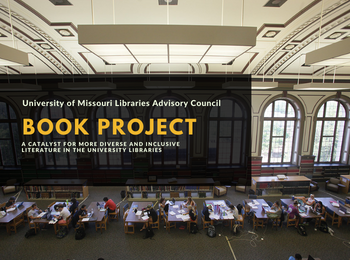
Happy reading, Tigers!
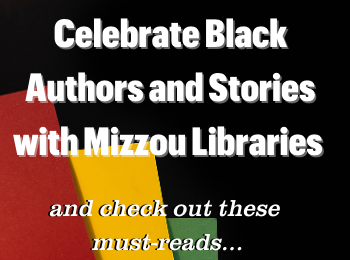
This month we are appreciating all the wonderful reads written by Black authors, showcasing Black stories.
Here are just a few of our favorite picks you can find available at Mizzou Libraries or request through our website.
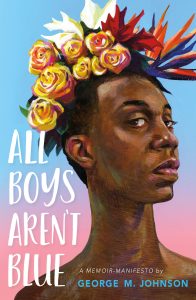 All Boys Aren’t Blue by George M. Johnson
All Boys Aren’t Blue by George M. Johnson
In a series of personal essays, prominent journalist and LGBTQIA+ activist George M. Johnson explores his childhood, adolescence, and college years in New Jersey and Virginia. From the memories of getting his teeth kicked out by bullies at age five, to flea marketing with his loving grandmother, to his first sexual relationships, this young-adult memoir weaves together the trials and triumphs faced by Black queer boys.
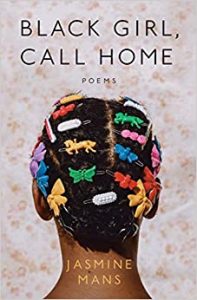 Black Girl, Call Home by Jasmine Mans
Black Girl, Call Home by Jasmine Mans
A literary coming-of-age poetry collection, an ode to the places we call home, and a piercingly intimate deconstruction of daughterhood, Black Girl, Call Home is a love letter to the wandering black girl and a vital companion to any woman on a journey to find truth, belonging, and healing. As a competitive spoken-word poet who draws large crowds of people, Jasmine Mans’s collection is divided into six sections, each with a corresponding active telephone number where she has recorded excerpts of her poems.
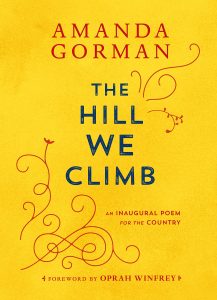 The Hill We Climb by Amanda Gorman
The Hill We Climb by Amanda Gorman
On January 20, 2021, Amanda Gorman became the sixth and youngest poet to deliver a poetry reading at a presidential inauguration. Taking the stage after the 46th president of the United States, Joe Biden, Gorman captivated the nation and brought hope to viewers around the globe.
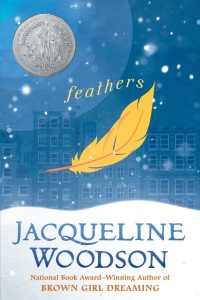 Feathers by Jacqueline Woodson
Feathers by Jacqueline Woodson
“Hope is the thing with feathers,” starts the poem Frannie is reading in school. Frannie hasn’t thought much about hope. There are so many other things to think about. Each day, her friend Samantha seems a bit more holy.There is a new boy in class everyone is calling the Jesus Boy. And although the new boy looks like a white kid, he says he is not white. Who is he?
Americanah by Chimamanda Ngozi Adichie
Americanah follows two Nigerian characters, Ifemelu and Obinze, teenagers in love who drift apart when Ifemelu moves to America. This novel wears its politics on its sleeve, acutely describing how it feels to try and navigate multiple cultures — a feeling that is endemic to being an immigrant — and openly debating the lived experiences of Black people, American or not.
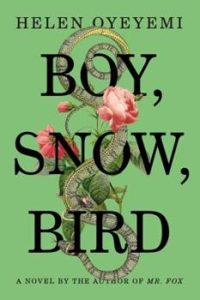 Boy, Snow, Bird by Helen Oyeyemi
Boy, Snow, Bird by Helen Oyeyemi
In the winter of 1953, Boy Novak arrives by chance in a small town in Massachusetts looking, she believes, for beauty—the opposite of the life she’s left behind in New York. She marries Arturo Whitman, a local widower, and becomes stepmother to his winsome daughter, Snow. A wicked stepmother is a creature Boy never imagined she’d become, but elements of the familiar tale of aesthetic obsession begin to play themselves out when the birth of Boy’s daughter, Bird, who is dark-skinned, exposes the Whitmans as light-skinned African-Americans passing for white. And even as Boy, Snow, and Bird are divided, their estrangement is complicated by an insistent curiosity about one another. In seeking an understanding that is separate from the image each presents to the world, Boy, Snow, and Bird confront the tyranny of the mirror to ask how much power surfaces really hold.

We’ve bought a lot of new books lately at the Health Sciences Library. Below are a few of our favorite additions.
Find the complete list of this month’s new books here. You can use the drop down menu to see previous month’s additions.
Have a purchase recommendation? You can request a book for your teaching or research using this form.
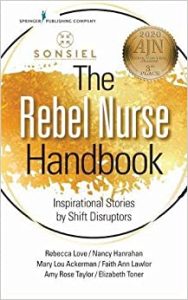 The rebel nurse handbook : inspirational stories by shift disruptors / Rebecca Love, Nancy Hanrahan, Antonette Montalvo, Mary Lou Ackerman, Faith Lawlor, Amy Rose Taylor, Elizabeth Toner.
The rebel nurse handbook : inspirational stories by shift disruptors / Rebecca Love, Nancy Hanrahan, Antonette Montalvo, Mary Lou Ackerman, Faith Lawlor, Amy Rose Taylor, Elizabeth Toner.
This compilation of stories from more than 40 diverse nurse leaders, innovators, and entrepreneurs portrays the winding and demanding paths that every nurse has braved in order to improve themselves, their patients’ care, and the healthcare of today. These Rebel Nurses push the boundaries of their profession by demanding a seat at the table of healthcare innovation, lobbying on Capitol Hill, expanding their horizons to fix the broken healthcare systems around the world, and valuing the humanity of the inevitable moments of life’s end. The inspiring innovation and entrepreneurship of these nurse leaders range from the incorporation of informatics or design communities and the implementation of artificial intelligence, to the creation of New York’s Silicon Valley or nationwide adolescent programs that focus on school shootings–consistently disrupting the status quo through implementing life-changing procedures and policies. Readers will be inspired to transform today’s era of healthcare by improving communities, implementing proactive care, and enhancing the environment of health and healing through research and policy application
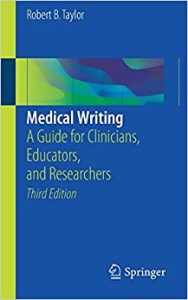 Medical writing : a guide for clinicians, educators, and researchers / Robert B. Taylor.
Medical writing : a guide for clinicians, educators, and researchers / Robert B. Taylor.
This book is a clear and comprehensive guide that assists readers in translating observations, ideas, and research into articles, reports, or book chapters ready for publication. For both researchers and practicing physicians, skills in medical writing are essential. The text includes in depth instructions for writing and publishing: review articles, case reports, editorials and letters to the editor, book reviews, book chapters, reference books, research protocols, grant proposals, and research reports. This third edition is additionally fully updated to include the intricacies of medical writing and publishing today, with new coverage of: open access, pay to publish and predatory journals, peer review fraud, publication bias, parachute studies, public domain images, and phantom authors
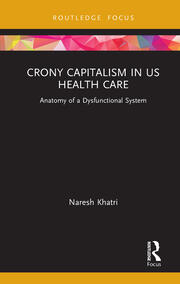 Crony capitalism in US health care : anatomy of a dysfunctional system / Naresh Khatri.
Crony capitalism in US health care : anatomy of a dysfunctional system / Naresh Khatri.
This book employs a broad theoretical framework of crony capitalism to understand US health care system dysfunction. This framework has not been applied before in any serious manner to understand the shortcomings in the US health care system. Specifically, the book examines the role of seven key players using this framework – politicians/interest groups, pharmaceutical companies, private health insurers, hospitals/hospital networks, physicians, medical device manufacturers, and the American public. Crony capitalism is a destructive force and is rampant in US health care system, causing much waste, inefficiencies, and malaise in the system. Current efforts and initiatives, such as patient-centered medical homes and precision medicine, for improving/reforming the system are of mere academic interest and tantamount to taking aspirin to treat cancer. They do not even pretend to address the root cause of the problem, namely, crony capitalism. Offering prescriptions to fix the U.S. health care system based on a comprehensive diagnosis of the dysfunction, this book will be of interest to researchers, academics, policymakers, and students in the fields of health care management, public and non-profit management, health policy, administration, and economics, and political science
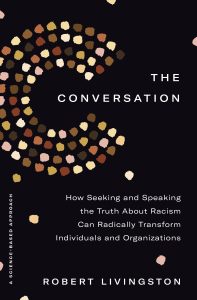 The conversation : how seeking and speaking the truth about racism can radically transform individuals and organizations / Robert Livingston.
The conversation : how seeking and speaking the truth about racism can radically transform individuals and organizations / Robert Livingston.
An essential tool for individuals, organizations, and communities of all sizes to jump-start dialogue on racism and bias and to transform well-intentioned statements on diversity into concrete actions-from a leading Harvard social psychologist. How can I become part of the solution? In the wake of the social unrest of 2020 and growing calls for racial justice, many business leaders and ordinary citizens are asking that very question. This book provides a compass for all those seeking to begin the work of anti-racism. Robert Livingston addresses three simple but profound questions: What is racism? Why should everyone be more concerned about it and can we do to eradicate it?
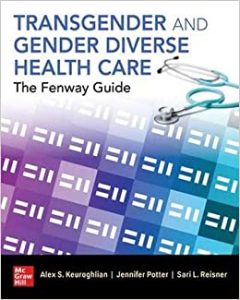 Transgender and gender diverse health care : the Fenway guide / editors, Alex S. Keuroghlian, Jennifer Potter, Sari L. Reisner.
Transgender and gender diverse health care : the Fenway guide / editors, Alex S. Keuroghlian, Jennifer Potter, Sari L. Reisner.
Demand for state-of-the-art health care services for transgender and gender diverse communities is rapidly increasing. Transgender and Gender Diverse Health Care: The Fenway Guide offers a roadmap for clinicians to provide culturally responsive care that meets the primary, preventive, and specialty health needs of transgender and gender diverse adult patients. With the most up-to-date scientific and clinical information, this practical guide reviews new data on terminology, demographics, and epidemiology; highlights key aspects of gender identity emergence across the lifespan; and provides guidance on both hormonal and surgical gender affirmation. Applying a health-equity model of care, this invaluable resource offers a foundation for clinicians when addressing health needs of transgender and gender diverse communities
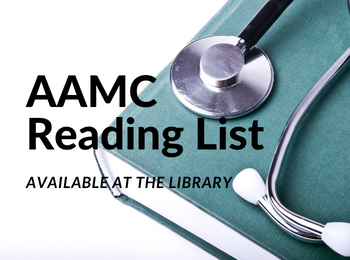
Back in November 2021, the Association of American Medical Colleges (AAMC) released a list of books authored by speakers set to speak at their 2021 virtual conference. It was their hope that conference attendees would read them in advance of the conference and host book discussions with each other.
Even though the conference is over, you can still read these books. Below are the books we have available at the libraries.
Dare to Lead: Brave Work. Tough Conversations. Whole Hearts.
Brené Brown, LMSW, PhD
Huffington Foundation Endowed Chair at The Graduate College of Social Work Research Professor, University of Houston Visiting Professor, Management, The University of Texas at Austin McCombs School of Business
Robert Livingston, PhD
Lecturer in Public Policy Harvard University John F. Kennedy School of Government Center for Public Leadership Social Psychologist and Diversity Consultant
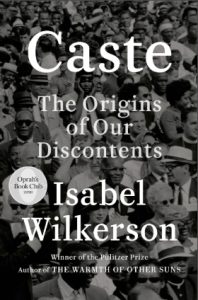 Caste: the Origins of Our Discontents
Caste: the Origins of Our Discontents
Isabel Wilkerson
Pulitzer Prize Winner and New York Times Best-Selling Author
George F. Will, PhD
Political Columnist, The Washington Post
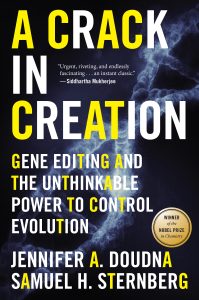 A Crack in Creation: Gene Editing and the Unthinkable Power to Control Evolution
A Crack in Creation: Gene Editing and the Unthinkable Power to Control Evolution
Jennifer Doudna, PhD
Biochemist, University of California, Berkeley Founder, Innovative Genomics Institute
Co-inventor of CRISPR Technology
Nobel Laureate in Chemistry
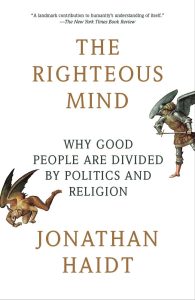 The Righteous Mind: Why Good People Are Divided by Politics and Religion
The Righteous Mind: Why Good People Are Divided by Politics and Religion
Jonathan Haidt, PhD
Professor, New York University Stern School of Business
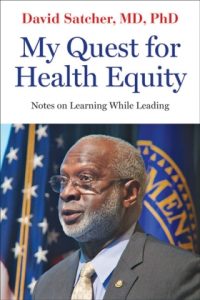 My Quest for Health Equity: Notes on Learning While Leading
My Quest for Health Equity: Notes on Learning While Leading
David Satcher, MD, PhD
Founding Director and Senior Advisor, Satcher Health Leadership Institute
Community Health and Preventive Medicine
Morehouse School of Medicine
Stephen Hinshaw, PhD
Professor and Vice Chair for Child and Adolescent Psychology, University of California, San Francisco
Professor of Psychology, University of California, Berkeley
Emma Goldberg
Journalist, The New York Times
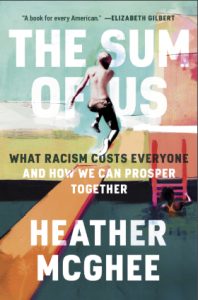 The Sum of Us: What Racism Costs Everyone and How We Can Prosper Together
The Sum of Us: What Racism Costs Everyone and How We Can Prosper Together
Heather McGhee, JD
Board Chair, Color of Change Regular Contributor, “Meet the Press” and “Real Time with Bill Maher”
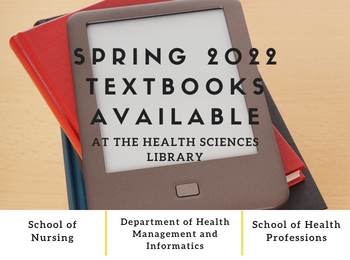
Spring 2022 required and recommended textbooks for classes in the School of Nursing, School of Health Professions and the Department of Health Management and Informatics are now available at the library. Each course has its own corresponding tab.
Paper copies are available on Health Sciences Library Reserve for a 24 hour checkout time. Any duplicate copies of textbooks are available and subject to regular check out times.
Be aware of the user limits on electronic textbooks. They are different depending on textbook and platform. We make note of any user limits.
Unfortunately, we don’t have all the books required for every class. If we don’t have your textbook, there are several avenues you can use to find a copy, which are all clearly labeled on each class page.
Textbook Guides:
If you need help accessing any of the textbooks, email asklibrary@health.missouri.edu.
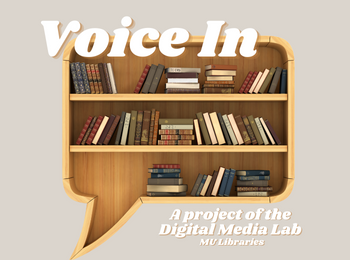
Voice In is a podcast about Mizzou students. This project of the Digital Media and Innovation Lab in Ellis Library was created to learn about students’ lives and their relationship to libraries.
In the first episode, Coffee Talks, we talk to junior Brooklyn Behrands about her coffee Instagram account, favorite place in Ellis Library and her insight on the best coffee shops in Columbia, including our very own Bookmark Cafe!
Check back on our site every month or subscribe to the podcast on your favorite app. https://libraryguides.missouri.edu/dml/voicein
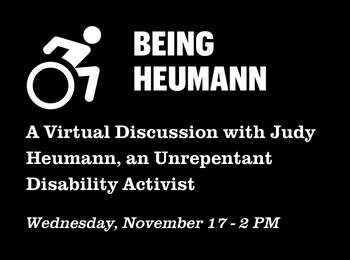
Wednesday, November 17 2021 at 2:00 PM
Join Event Online
The University of Missouri will virtually host Ms. Judy Heumann, a civil rights activist and author. She recently released her memoir titled Being Heumann: An Unrepentant Memoir of a Disability Rights Activist and was featured in the Emmy-nominated documentary, Crip Camp, about the development of the Disability Rights movement. Ms. Heumann’s leadership was instrumental in pushing Congress to enact major disability rights legislation and then pressing the Executive Office to regulate and enforce the law. Please join us in a virtual discussion about her experiences advocating for herself and other disabled citizens.
Event hosted by: MU Disability Center; Division of Inclusion, Diversity, & Equity; Michael A. Middleton Center for Race, Citizenship, and Justice; Mizzou Hillel; College of Education and Human Development; School of Law Library; University of Missouri Advancement; University of Missouri Libraries; Women’s Studies; School of Health Professions; Mizzou Ed Bridge
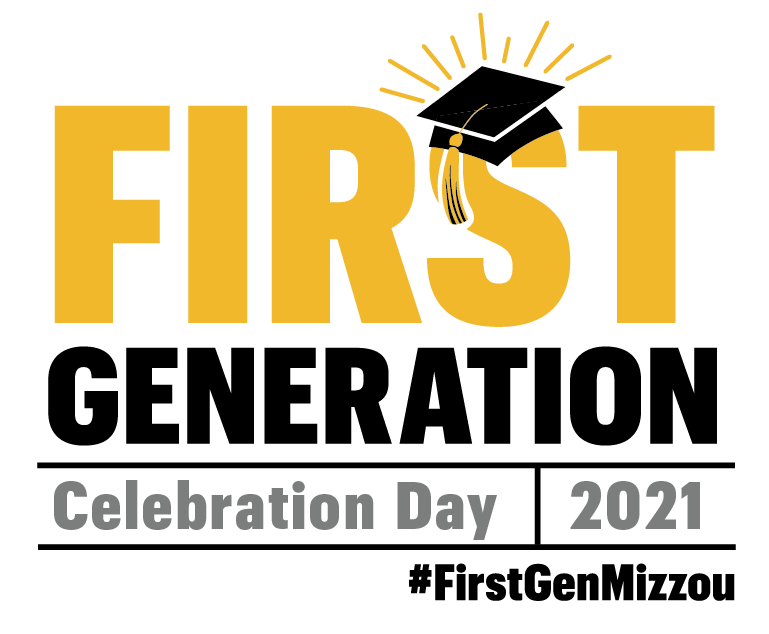
November 8th is National First-Generation College Celebration Day and we are thrilled to celebrate our first-generation students, faculty and staff at Mizzou. Additional information, success stories and resources (Zoom backgrounds, social media graphics) to celebrate and support our first-generation students can be found on our website.
One of the featured events on November 8th is “Open Door Day” which invites first-generation students to stop by during open hours to talk with faculty and staff to connect and learn about opportunities. There are more than 90 individuals planning to open their doors to first-generation students! To see a list of individuals participating, please see the website.
The following participants will have open office hours in Ellis Library:
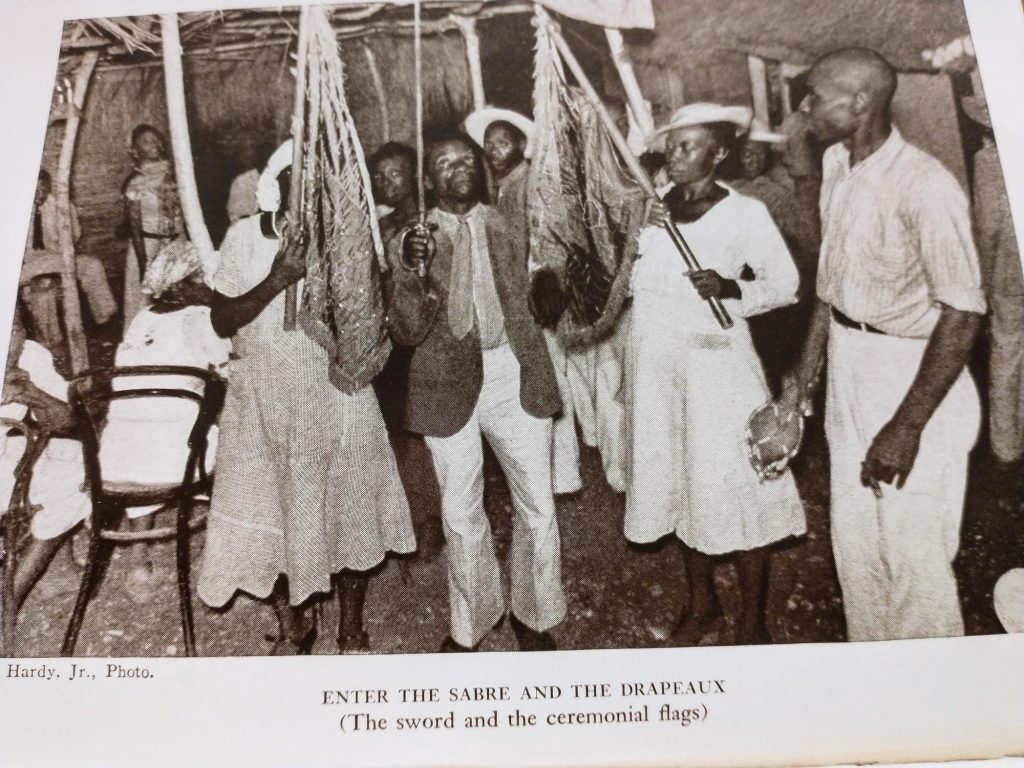
Leaders and Heroes 2: The Arts is Special Collections’ newest digital exhibit, curated by Courtney Gillie and John Henry Adams. A continuation of the 2020 exhibit Leaders and Heroes, we continue to spotlight art, articles, and monographs by historically excluded people. Starting with the LGBTQIA icon Sappho, the exhibit was created to reflect the openly diverse world we live in now. Explore beautiful, hand-crafted wood engravings in Shall we join the ladies? and then dive into the community and culture that expelled Japanese American families built in Tanforan Racetrack horse stalls in Citizen 13660.
Leaders and Heroes exist in good times and bad. Pulling from Mizzou’s many libraries on campus, our further reading section is full of primary and secondary sources for additional contextual information on the history and identity of each fascinating creator featured in Leaders & Heroes 2. We hope you will be entertained by the wit of William Woo and Zora Neale Hurston, moved by the art of Miné Okubo and the Kiowa 5, then inspired by the poetry of Sappho and relentless writings of Lydia Maria Child to advocate yourself.
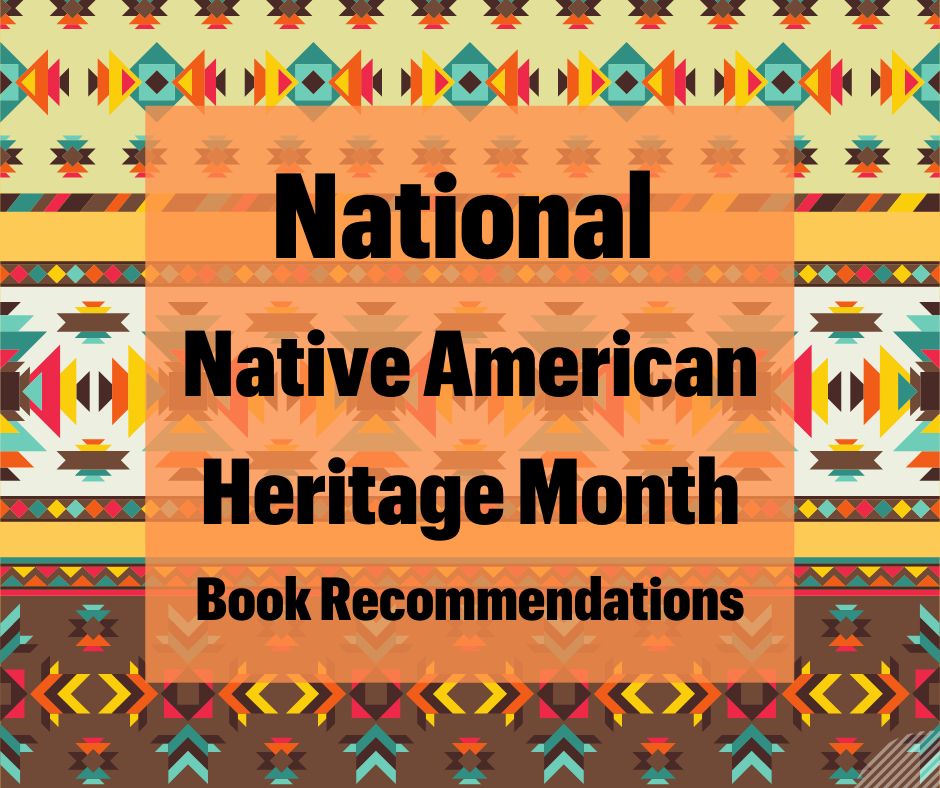
3November is National Native American Heritage Month. To celebrate at Mizzou Libraries, we’ve curated a list of books with the help of Mizzou’s Four Directions. Thank you to Four Directions for taking the time to share your expertise and recommendations.
Below are a few we have available for check out. You can view the whole list of book recommendations here.
Interested in more than books? Four Directions has compiled a list of resources including podcasts, articles, blogs, etc.
Have a purchase recommendation? Use our book recommendation form.
The Sioux Chef’s Indigenous Kitchen Hardcover, Sean Sherman
Here is real food—our indigenous American fruits and vegetables, the wild and foraged ingredients, game and fish. Locally sourced, seasonal, “clean” ingredients and nose-to-tail cooking are nothing new to Sean Sherman, the Oglala Lakota chef and founder of The Sioux Chef. In his breakout book, The Sioux Chef’s Indigenous Kitchen, Sherman shares his approach to creating boldly seasoned foods that are vibrant, healthful, at once elegant and easy.
2018 James Beard Award Winner: Best American Cookbook
I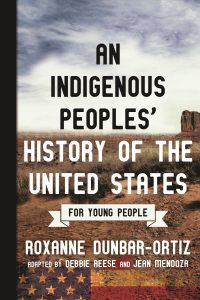 ndigenous Peoples’ History of the United States, Roxanne Dunbar-Ortiz
ndigenous Peoples’ History of the United States, Roxanne Dunbar-Ortiz
Going beyond the story of America as a country “discovered” by a few brave men in the “New World,” Indigenous human rights advocate Roxanne Dunbar-Ortiz reveals the roles that settler colonialism and policies of American Indian genocide played in forming our national identity. The original academic text is fully adapted by renowned curriculum experts Debbie Reese and Jean Mendoza, for middle-grade and young adult readers to include discussion topics, archival images, original maps, recommendations for further reading, and other materials to encourage students, teachers, and general readers to think critically about their own place in history.
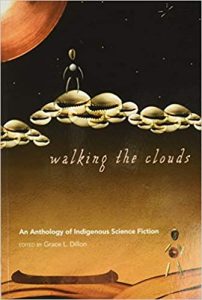 Walking the Clouds: An Anthology of Indigenous Science Fiction, Grace Dillon
Walking the Clouds: An Anthology of Indigenous Science Fiction, Grace Dillon
In this first-ever anthology of Indigenous science fiction Grace Dillon collects some of the finest examples of the craft with contributions by Native American, First Nations, Aboriginal Australian, and New Zealand Maori authors. The collection includes seminal authors such as Gerald Vizenor, historically important contributions often categorized as “magical realism” by authors like Leslie Marmon Silko and Sherman Alexie, and authors more recognizable to science fiction fans like William Sanders and Stephen Graham Jones. Dillon’s engaging introduction situates the pieces in the larger context of science fiction and its conventions.
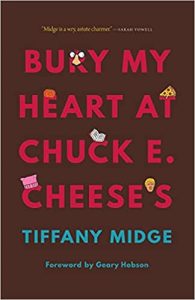 Bury My Heart at Chuck E. Cheese’s, Tiffany Midge
Bury My Heart at Chuck E. Cheese’s, Tiffany Midge
Bury My Heart at Chuck E. Cheese’s is a powerful and compelling collection of Tiffany Midge’s musings on life, politics, and identity as a Native woman in America. Artfully blending sly humor, social commentary, and meditations on love and loss, Midge weaves short, standalone musings into a memoir that stares down colonialism while chastising hipsters for abusing pumpkin spice. She explains why she doesn’t like pussy hats, mercilessly dismantles pretendians, and confesses her own struggles with white-bread privilege.
This beautiful and devastating book—part tribal history, part lyric and intimate memoir—should be required reading for anyone seeking to learn about California Indian history, past and present. Deborah A. Miranda tells stories of her Ohlone Costanoan Esselen family as well as the experience of California Indians as a whole through oral histories, newspaper clippings, anthropological recordings, personal reflections, and poems. The result is a work of literary art that is wise, angry, and playful all at once, a compilation that will break your heart and teach you to see the world anew
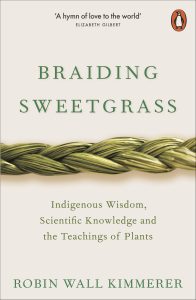 Braiding Sweetgrass, Robin Wall Kimmerer
Braiding Sweetgrass, Robin Wall Kimmerer
Drawing on her life as an indigenous scientist, and as a woman, Kimmerer shows how other living beings―asters and goldenrod, strawberries and squash, salamanders, algae, and sweetgrass―offer us gifts and lessons, even if we’ve forgotten how to hear their voices. In reflections that range from the creation of Turtle Island to the forces that threaten its flourishing today, she circles toward a central argument: that the awakening of ecological consciousness requires the acknowledgment and celebration of our reciprocal relationship with the rest of the living world. For only when we can hear the languages of other beings will we be capable of understanding the generosity of the earth, and learn to give our own gifts in return.